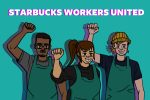“I have a passion for coffee,” I said.
What I really meant by this was that I am mildly addicted to caffeine. “I love working on a team and I always make the best use of my time,” I said. What I meant, of course, was that I had previously googled and memorized what the best things to say in a job interview were.
I had somehow already made it past the first interview and if I managed to play my cards right this time around, I was on my way to getting a job at Starbucks.
I needed a job to fill the summer after senior year of high school, and working at Starbucks seemed like the coolest job a person could have. I thought that if I was hired it was because of how trendy and cool I was, and not at all a result of the half-truths I told in my interview and the fact that the company desperately needed baristas.
When I was offered the job I was overjoyed. I was sure that everything would go smoother than a hand steamed soy latte. (I did turn out to be an excellent soy milk steamer.)
When I went in for orientation I was immediately overwhelmed. My new coworkers and I watched a few hours worth of video on honesty and safety in the workplace. I had to remember the passcode to the break room, my employee ID number, the names of my coworkers and all the rules and procedures. The manager took us on a tour of the store and I could barely remember where the bathroom was. I walked out a few hours later knowing that the job was going to be a lot harder than I thought.
My family has a long history working in food service. My maternal grandmother single-handedly owns and manages a steak house that she and my grandfather bought almost 40 years ago.
The restaurant isn’t widely known, but there are a lot of “regulars.” Most of the customers are couples over the age of 40, who adore the restaurant for its food and cozy, candle-lit atmosphere.
When my aunts, uncles, and cousins were growing up, it was customary for them to work as dishwashers or waitresses in the restaurant—it was, and still is, a true family-run business.
The only experiences I had working at the restaurant were the few times when I was younger that I had run the coat check with a couple friends. I helped on the busiest nights so there was a constant stream of customers from around five to nine pm, but with the three of us in the coatroom, the work was manageable. This was my comfortable and easy introduction to the workforce.
If there was a constant stream of customers at the restaurant, at Starbucks there was a relentless inundation. Has anyone ever told you not to talk to them until they’ve had their morning coffee? Well, that’s impossible when you’re the one taking coffee orders.
When training began, my shift supervisor Emma started by teaching me the basics. “Tall drinks get three flavor pumps, grande drinks get four and venti drinks get five. For espresso shots, it’s one for tall and two for grande and venti.” With the alacrity and determination of someone who had just finished 13 years of public education memorizing and regurgitating information that no one actually needs to know, I learned this as quickly as possible.
Emma, who was unconditionally positive, complimented me on how quickly I seemed to be picking things up. Where my skills lacked, though, was when I had to apply this knowledge to actually making drinks and serving customers.
During one of my first shifts after training, I was making drinks while Emma ran the cash register. The next customer in line walked up, ordered and paid while Emma recorded his drink and name on the cup. She slid the cup down the bar for me to make the drink. This was my time to shine.
I remembered that “IC” on the cup meant iced coffee and that “C” meant caramel syrup. I poured the coffee in up to the right line and pumped the correct amount of syrup in the cup. I looked at the name, “Sam,” scrawled on the cup in sharpie and called out, “Iced coffee for Sam?” at the end of the bar. That went great, I thought.
I had already moved on to the next lady’s frappuccino, when, after a minute, Sam walked back up. “Um, this was supposed to be an iced coffee… but there’s no ice in it.” Emma looked at me incredulously. “Not my best work,” I acknowledged.
This turned out not to be an isolated incident, but rather an indicator of how the rest of my limited time at Starbucks would go.
There were three jobs to be filled during every shift—drinks, register and support (preparing food and helping with drinks). I was not good at any of them. I was way too slow working the register, and I dropped food and plates as though I had forgotten how to hold things.
I began to feel like I would never get everything straight. As it turns out, apparently, you have to be able to do more than just steam soy milk to be an effective Starbucks employee. I started to wonder if I was going to get fired, and if not, if I should just quit.
One day I got home from work and told my parents that it was going awfully. “I don’t think I’m meant to work in food service. I have to quit.”
“You’re not quitting,” they informed me. “At least not until college starts in the fall.” My brother had been working the same job at a sub shop all the way through high school and college. My parents, reasonably, expected me to be able to do for a few months what my entire family seemed to be able to do for years.
Maybe they didn’t understand exactly what I was going through, but they tried to empathize, and my mom told me about her past working in food service. She said that after her parents bought the steakhouse (that my grandmother still owns), she had to work in the kitchen to help out when she was 16.
With six older siblings already moved out and only one younger brother, she had a massive responsibility to help out her parents as they were still learning the ropes of managing a restaurant. I had heard my mom talk about this before, but now it took on a new kind of significance.
About two months after I started working, (not to my surprise) I was fired. I was supposed to be working an eight-hour shift that day, but about three hours in, my manager brought me in to the back room to tell me the news. “I can tell it’s not going to work out,” she said. “Your urgency is just not there.” I urgently wanted to leave the room.
Some people, upon getting fired from their jobs, are probably unhappy. Many are angry, some might even feel despair. I was immensely relieved.
Definitely relieved that I wouldn’t have to finish the eight-hour shift, but mostly just relieved that I would no longer feel the pressure, anxiety and responsibility that this job invoked, ever again. (Also a little bit sad that I wouldn’t get to use the soymilk steamer anymore.)
On my way home, I thought about my parents and grandparents and realized the profundity of the privilege I was born into that allows me to feel relief upon being fired from my job.
Only because my parents and grandparents didn’t have that choice, only because they had to work unstoppably hard, am I able to lose my job and still know that school will be paid for. Even many of my friends and classmates don’t have the freedoms that I do.
I guess new jobs are always learning experiences, and Starbucks managed to open my eyes and wake me up in a different way than it usually does for people. So for my incompetence to prepare coffee in any way more complicated than pressing a button on a Keurig, I am eternally grateful.


















I couldn’t relate more to this article. I’ve been a newbie at Starbucks for a couple of weeks now and the job is only leading me to feel dumb and incompetent. It’s stressful and you feel the need to ask a lot of questions when sometimes the people around you have no patience for that. I was practically fighting tears towards the end of my shift, it’s so hard it amazes me as to how some people have it so naturally dialed in. I just feel like an idiot who’s messing everyone up.
I felt the same way. I was so stressed and overwhelmed, that even my dreams were nightmares, filled with lines of customers. It doesn’t help that starbucks expects you to know everything in less than two weeks of training with less than 20 hours assigned to your shift. I don’t know bout anyone else, but you actually need more time to learn and the manager rushing you through and not answering your questions, is not going to help you feel, at ease with the job. In addition, it doesn’t help that the pay is low, so your struggling to pay your bills as well as balance learning to be a good barista. I was extremely happy to give notice. The job was toxic for me, and I will be whistling and smiling through my last shift. Free at last. :3